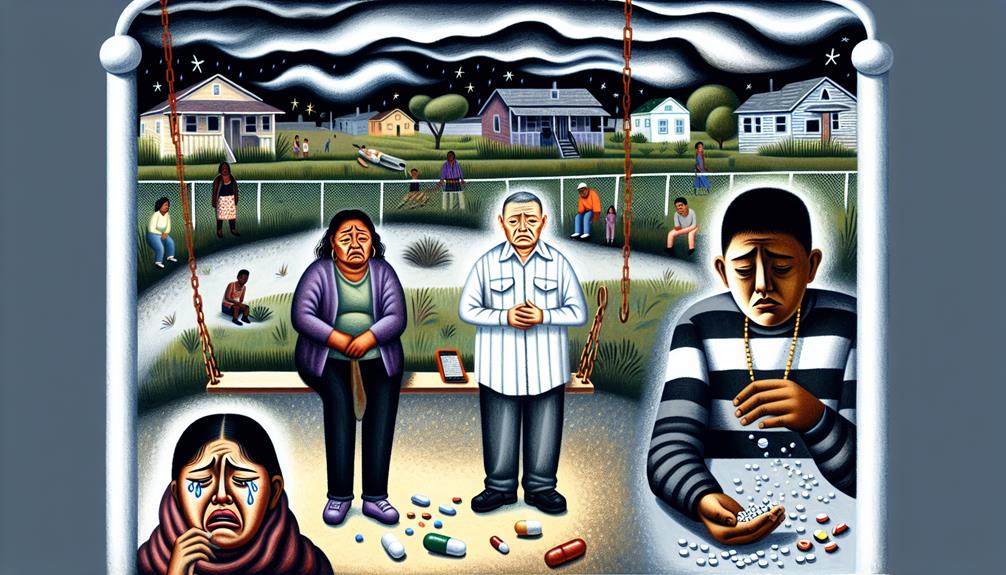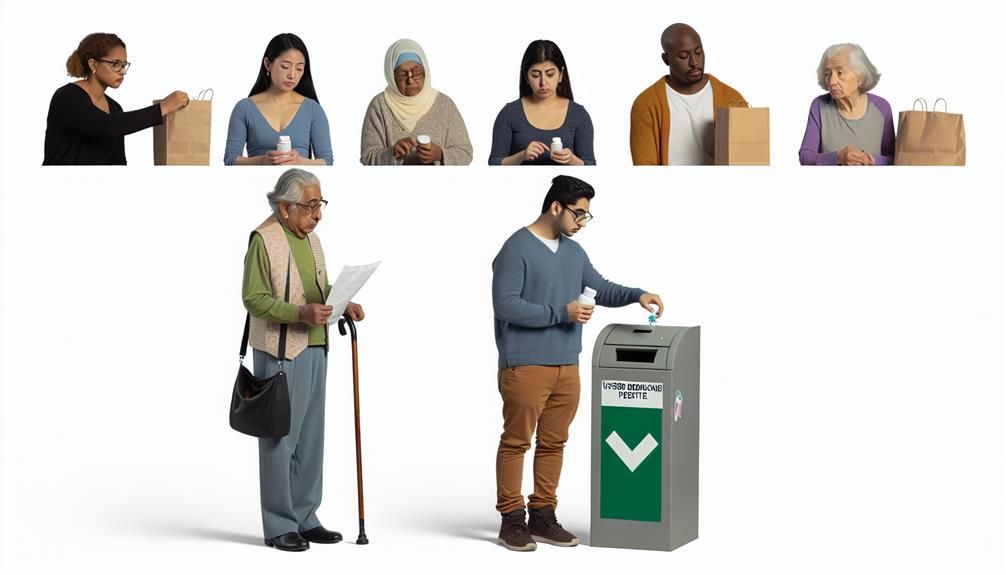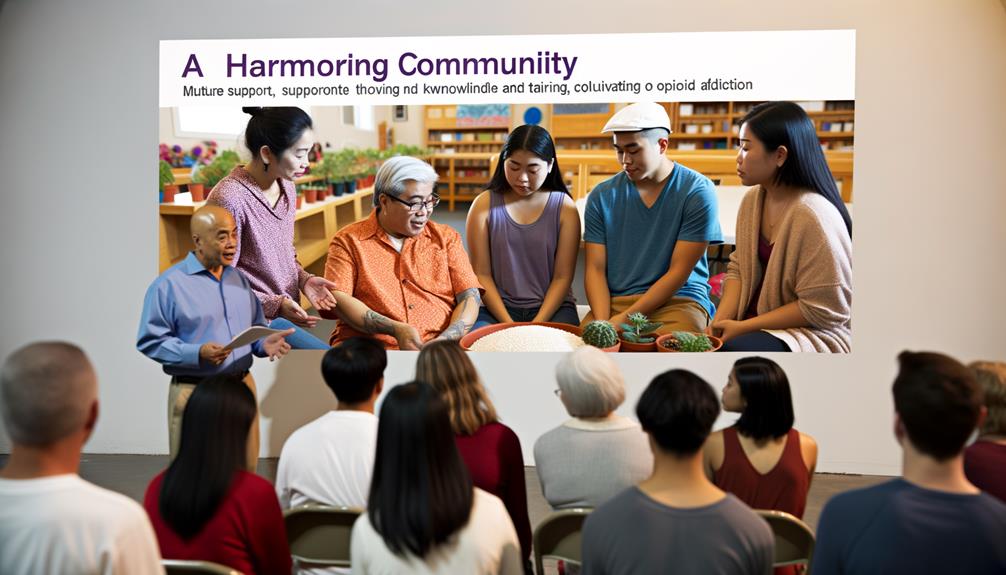So, you've heard about the opioid epidemic, huh? Well, buckle up and get ready to navigate through a comprehensive guide that will empower your community to take action.
In this guide, you'll uncover the ins and outs of the opioid crisis, from understanding the signs of prescription drug abuse to promoting safe medication disposal practices.
But that's not all – we'll also dive into educating on the dangers of opioid misuse and explore ways to support recovery and overcome the stigma surrounding addiction.
Are you ready to equip yourself with the knowledge and tools needed to make a difference? Well, get ready, because this guide has got you covered.
Understanding the Opioid Epidemic

To truly grasp the magnitude of the opioid epidemic, imagine a community ravaged by addiction, where lives are shattered and families torn apart. The impact of the opioid crisis is devastating, affecting individuals of all ages, races, and socioeconomic backgrounds. It's a crisis that knows no boundaries, infiltrating our cities, towns, and even rural areas. The consequences are far-reaching, leading to increased rates of overdose deaths, broken relationships, and economic burdens.
However, amidst this darkness, there's hope. Prevention strategies play a crucial role in combating the opioid epidemic. Education is key, as it empowers individuals with knowledge about the risks associated with opioid use and the alternatives available. Awareness campaigns, such as public service announcements and community forums, aim to reach a wide audience and promote understanding.
Additionally, healthcare providers are implementing prescription monitoring programs to prevent overprescribing and identify at-risk individuals. These programs track patients' opioid prescriptions, allowing healthcare professionals to intervene early and provide necessary support. Furthermore, increasing access to evidence-based treatments, such as medication-assisted treatment and counseling, is essential for those struggling with opioid addiction.
Recognizing the Signs of Prescription Drug Abuse
Recognizing the signs of prescription drug abuse is essential in order to protect yourself or your loved ones from the dangers of opioid addiction. It can be difficult to identify when someone is struggling with prescription drug abuse, as the signs may vary depending on the individual and the specific drug being abused. However, there are common warning signs that can help you intervene and seek help before the situation worsens.
Identifying warning signs:
- Changes in behavior: Look for sudden mood swings, increased irritability, or unexplained aggression.
- Physical symptoms: Observe for constricted pupils, drowsiness, slurred speech, or sudden weight loss.
- Neglecting responsibilities: Notice if the person starts missing work, neglecting personal hygiene, or losing interest in hobbies and activities.
Intervention strategies:
- Educate yourself: Learn about prescription drug abuse and the specific drugs being abused in order to understand the situation better.
- Open communication: Approach the individual with empathy and concern, expressing your worries about their behavior and offering support.
- Seek professional help: Encourage the person to consult a healthcare professional or addiction specialist who can provide guidance and treatment options.
Promoting Safe Medication Disposal Practices

If you or someone you know is struggling with prescription drug abuse, it's important to not only recognize the signs but also understand the importance of promoting safe medication disposal practices. By taking the necessary steps to dispose of your medications safely, you can prevent accidental ingestion and help protect the environment.
Preventing accidental ingestion is crucial, especially when it comes to prescription drugs. Unused medications left lying around can easily be mistaken for candy or other harmless substances, leading to unintentional ingestion by children or pets. This can result in serious health complications or even fatalities. By properly disposing of your medications, you can eliminate this risk and ensure the safety of those around you.
Additionally, the environmental impact of improper disposal can't be ignored. When medications are flushed down the toilet or thrown in the trash, they can end up contaminating our water systems or polluting the soil. This can have detrimental effects on aquatic life and ecosystems. By following safe medication disposal practices, such as utilizing drug take-back programs or following FDA guidelines for disposal, you can help minimize the environmental impact of these substances.
Educating on the Dangers of Opioid Misuse
Understanding the dangers of opioid misuse is essential for safeguarding your health and the well-being of those around you. By educating yourself and others about the risks associated with opioid misuse, you can play a vital role in preventing its devastating consequences. Here are some key points to consider:
- Prevention Strategies:
- Educate yourself about the proper use of opioids, including the correct dosage and duration of treatment.
- Be aware of the signs of opioid misuse, such as increased tolerance, withdrawal symptoms, and changes in behavior.
- Communicate openly with your healthcare provider about your medical history, any past substance abuse issues, and any concerns you may have about opioid medications.
- Community Resources:
- Take advantage of educational programs and workshops offered by local organizations to learn more about opioid misuse and its consequences.
- Seek support from community-based groups that focus on substance abuse prevention and treatment.
- Utilize helplines and online resources that provide information, guidance, and support for individuals struggling with opioid misuse.
Supporting Recovery and Overcoming Stigma

Supporting you in your journey of recovery from opioid misuse and challenging the stigma surrounding addiction is crucial for fostering a compassionate and understanding society. We understand that overcoming barriers can be challenging, but please know that you aren't alone. There are numerous community resources available to provide the support and assistance you need.
One of the main barriers to recovery is the stigma associated with addiction. This stigma often prevents individuals from seeking help and can make the recovery process even more difficult. However, it's important to remember that addiction is a disease, not a moral failing. By challenging the misconceptions and judgment surrounding addiction, we can create an environment that promotes empathy and understanding.
Community resources play a vital role in supporting your recovery journey. These resources can include support groups, counseling services, and treatment centers. Support groups provide a safe space to share experiences, gain insights, and receive encouragement from others who've walked a similar path. Counseling services offer professional guidance and support to address the underlying causes of addiction. Treatment centers provide comprehensive care, including detoxification, therapy, and aftercare support.








